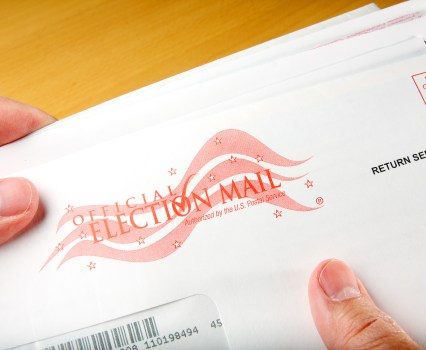This year’s election is unsurprisingly generating a deluge of voting-related lawsuits in the runup to November. Already, the U.S. Supreme Court weighed in last month on an Arizona proof-of-citizenship voting requirement. The U.S. Court of Appeals for the Fifth Circuit earlier this week heard oral arguments in a case (on which one of us wrote earlier) about a Mississippi law that (like the laws of many other states) allows the counting of mail-in ballots that are postmarked on or before Election Day but that are delivered to the precincts a few days after Election Day. These legal disputes regarding technical aspects of voter registration and ballot counting are impactful. But obsessive focus on these rules can risk missing the forest for some of the trees. Hidden in plain sight—in the state statutes of eight states, to be precise—are absentee-ballot-eligibility requirements that explicitly favor individuals over a certain age, and in so doing violate the unambiguous language and plain public meaning of the Twenty-Sixth Amendment to the U.S. Constitution. For those who haven’t looked at that Amendment recently, its words provide, quite straightforwardly, that, for citizens of the United States who are at least eighteen, the right to vote “shall not be denied or abridged by the United States or any state on account of age” (emphasis added).
Indiana, Louisiana, Mississippi, South Carolina, and Texas grant absentee-voting eligibility specifically for all voters sixty-five or older, while Tennessee uses the lower threshold of sixty. West Virginia statutorily grants absentee ballots to individuals because of “immobility due to extreme advanced age,” but not to young people with mobility issues (which is distinguished from a disability, which is a separate justification). Perhaps most offensive (because the state’s statutory words nearly perfectly track the textual prohibition of the Twenty-Sixth Amendment itself) is Kentucky’s granting of absentee eligibility for those not able to appear at the polls “on the account of age.”
While the Twenty-Sixth Amendment surely encompassed the enactors’ short-term objective of allowing eighteen-year-olds to vote, its clear language and constitutional history require more broadly that, except as otherwise provided specifically in the Constitution, government simply not use age as a criterion for determining access to voting (and other political rights like jury service and officeholding).
To see why, start with the Amendment’s text. The wording is identical to that of the Fifteenth and Nineteenth Amendments (save for the respective references to age, race, and sex). As an intratextualist matter, these provisions should generally be interpreted in the same way. So just as the Fifteenth Amendment did not say merely that all adult Black men shall enjoy the franchise (and instead prohibits race discrimination in voting more broadly), the Twenty-Sixth Amendment did not provide only that eighteen-year-olds could vote.
The latter Amendment’s public legislative history confirms this reading. As Representative Richard Poff put it, “Just as the Fifteenth Amendment prohibits racial discrimination in voting and just as the Nineteenth Amendment prohibits sex discrimination in voting, the proposed [Twenty-Sixth] amendment would prohibit age discrimination in voting.” And if further proof that the Amendment prohibits all forms of age discrimination were needed, Poff added that it “would protect not only an 18-year-old, but also the 88-year-old.” There are many other statements in the public record in which promoters of the Twenty-Sixth Amendment made clear their intent to pattern its words and implications on those of the Fifteenth and Nineteenth.
The state laws listed above clearly fly in the face of the Twenty-Sixth Amendment’s text and history. While sixty-five-year-olds who are not otherwise absent from the state or disabled are eligible for absentee voting based on age alone in Indiana, Louisiana, Mississippi, South Carolina, and Texas (and sixty-year-olds in Tennessee), similarly situated sixty-four-year-olds in those states (and fifty-nine-year-olds in Tennessee) are denied that right solely on account of their age difference. (Similar discrimination operates in West Virginia against young persons with mobility issues. And although Kentucky doesn’t specify how age factors into its decisions about absentee ballots, presumably older people more generally, rather than those above a clear age threshold, are given more access to absentee ballots simply because of their age.) These distinctions violate the clear textual command of the Amendment, a command buttressed by public discussions at the time of enactment. (And although age is not a so-called “suspect classification” when it comes to economic and civil rights under the Equal Protection Clause of the Fourteenth Amendment, that is irrelevant when it comes to voting and other political rights, given the Twenty-Sixth Amendment’s explicit ban on voting discrimination “on account of age.”)
Unfortunately, the two U.S. Courts of Appeals to have considered age-discriminatory absentee-eligibility rules have botched the analysis and completely missed the central point that the Twenty-Sixth Amendment, like the Fifteenth and Nineteenth Amendments, is not about voting rights generically, but about voting equality.
In 2020, the Fifth Circuit by a 2-1 vote rejected a Twenty-Sixth Amendment challenge to Texas’s law in Texas Democratic Party v. Abbott. As one of us wrote just days later, that decision was “deeply misguided.” While the opinion rightly rejected the defendants’ claims that the Amendment did no more than lower the voting age to eighteen, two judges (one 70 years old and the other over 80 years old at the time) held that the law did not “deny or abridge” the right of those younger than sixty-five to vote. According to the court, a law runs afoul of the Amendment “only if it makes voting more difficult for [a] person than it was before the law was enacted or enforced.” Because persons under sixty-five had no option to vote early by mail before the statute’s 1975 enactment, they did not lose any rights following the law’s passage. That the absentee-eligibility law “makes it easier for others to vote does not abridge any person’s right to vote for the purposes of the Twenty-Sixth Amendment.”
This interpretation of “deny or abridge” makes no sense. First, it conditions voting rights on historical accidents. If early, absentee voting happened to be pervasive before 1975, the Fifth Circuit’s reasoning suggests, then the statute would have been unconstitutional, even though the effect and words of the 1975 law would have been unchanged. Second, the opinion opens the door to manipulation:
Suppose Texas wants to make it harder for young people to vote but has in place a law that allows everyone to vote early. Exempting only young people would . . . constitute an abridgment in the eyes of the [Fifth Circuit] panel. So what should Texas do? Repeal early voting for all, wait a while, and then reinstate it only for older persons—voila! How is a court to know when such a sequence reflects a good-faith effort at legislative experimentation, or a cynical effort to circumvent a manipulable test?
More fundamental, however, is how the Fifth Circuit missed the core equality principles undergirding the Twenty-Sixth Amendment. This failure is striking considering that the court purported to recognize that the Twenty-Sixth Amendment’s phrasing consciously copied the same words of the Fifteenth and Nineteenth Amendments, and emphasized that interpreting the Twenty-Sixth required a “focus [on] . . . how the same or at least similar terms that also appeared elsewhere in the Constitution ha[ve] been interpreted.” Surely, if Texas had permitted only white or male voters to vote absentee, the Fifth Circuit would have understood that such laws would violate the Fifteenth and Nineteenth Amendments, respectively. Yet these obvious comparisons didn’t even occur to the judges.
In Tully v. Okeson, the Seventh Circuit fared perhaps slightly better—although it still reached the outrageously wrong result. The court there dealt with Indiana’s sixty-five-or-older absentee-eligibility provision. To its credit, the Seventh Circuit made some of the right analytic moves. It too recognized the Twenty-Sixth Amendment’s parallelism with the Fifteenth and Nineteenth Amendments. Citing the Fifth Circuit, it acknowledged that the Twenty-Sixth goes beyond granting political rights to eighteen-year-olds. It even rejected the Fifth Circuit’s completely untenable (and borderline bizarre) approach of comparing voting rights before and after the challenged law’s enactment, instead holding that the “starting point is the right to vote, which may or may not be secured by the status quo of state law.”
Yet following an extensive discussion of Supreme Court precedent on the phrases “abridgement” and “right to vote,” it devoted just three paragraphs—with no citations to caselaw—to reject the Twenty-Sixth Amendment challenge. These paragraphs laid out the statutorily provided avenues for voting and concluded that those under sixty-five had not had their right to vote abridged even though they had no entitlement to vote absentee simply because their other voting options weren’t too bad. The absentee eligibility for those sixty-five and older was an “accommodation of the elderly” that “hardly creates a material burden on the exercise of the franchise of other citizens.”
Like the Fifth Circuit, the Seventh missed the boat by missing the Twenty-Sixth Amendment’s broad and straightforward command of equality. The issue is not whether anyone is in fact able to vote; it is whether people are being treated unequally with respect to the ability to vote based on some prohibited classification or criterion. Like the Fifth Circuit, the Seventh Circuit did not see, and thus had no answer to, analogies to race and gender. If the law in question “hardly creates a material burden” on younger voters, then why would a law giving only whites (whose higher employment rates might lead some people to think they need “accommodations”) absentee-voting options create “a material burden” on non-white voters? Indeed, the court justified the Indiana law as “represent[ing] a sound legislative judgment that [elderly] individuals encounter special barriers in exercising their right to vote.” Yet were a state to establish and document that white employees work more hours than employees of other races and thus need absentee ballots because getting time off work is harder for whites, such a law would still be squarely foreclosed by the Supreme Court’s Fifteenth Amendment decision in Rice v. Cayetano: “Color and previous condition of servitude . . . are forbidden criteria or classifications.” This implication of the Fifteenth Amendment should hold for sex and age, given the identically worded Nineteenth and Twenty-Sixth Amendments. For a Supreme Court that believes in following plain meaning of enacted words and also in prohibiting odious government classifications (rather than focusing on which particular groups are helped or hurt by various laws), the text of the Twenty-Sixth Amendment couldn’t be any clearer.
But even if we focus less on forbidden classifications and more on whether groups are being helped or hurt, we cannot ignore the likely partisan aspects of the laws in question. One reason the Framers of the Twenty-Sixth Amendment cared so much about enshrining age equality in the Constitution was their belief that older voters and younger voters tend to see the world—and thus vote—differently. Exit polls from the 2020 presidential election show that voters forty-four and younger broke for Joe Biden, voters between forty-five and sixty-four were almost evenly split, and voters sixty-five and older broke for Donald Trump. A Pew Research Center report from April 2024 found that while voters in their forties and fifties exhibited a partisan skew within 3%, those younger than forty favored Democrats and those older than sixty leaned Republican.
Is it any wonder or surprise that the states that make use of age and that favor older voters with respect to absentee eligibility—all eight out of eight—are reliably red states? And while the Republican presidential candidate will, for the foreseeable future, likely capture all the electoral votes from all these states regardless of absentee eligibility, there are plenty of contested U.S. Senate, U.S. House, and down-ballot state-office races in these states for which small partisan advantages in voter turnout matter. To cite just a few examples from recent federal elections: incumbent Republican Senator Ted Cruz of Texas won reelection in 2018 by 2.6%, and he seems to be in a close race this year; the 2018 and 2020 elections in South Carolina’s First Congressional District were decided by less than 1.4% (or 6,000 votes) and; in the 2019 Kentucky gubernatorial election Democrat Andy Beshear bested incumbent Republican Matt Bevin by only 0.4% (a margin of just over 5,000 votes).
The bottom line is that the Twenty-Sixth Amendment prohibits voting regulations that discriminate based on age—whether these regulations are well-intentioned or purely partisan. Such overtly discriminatory laws (and it’s important to note we are talking here about laws that openly classify on account of age, not laws that might simply have disparate impacts along age lines) are not likely to be repealed anytime soon. While the Purcell doctrine counsels against courts altering these regulations so close to the November election, faithful interpreters and defenders of the Constitution should, after the dust of the 2024 election settles, take direct aim at these laws that violate the Amendment’s command of equality. Although the Fifth and Seventh Circuits have not acquitted themselves well, there is still an opportunity for the Sixth Circuit (which houses Kentucky and Tennessee) and the Fourth Circuit (which houses South Carolina and West Virginia) to do better. And whether or not there emerges any circuit split, a U.S. Supreme Court that has any remotely principled commitment to originalism and original public meaning of the U.S. Constitution needs to vindicate the plain words and clear purpose of the Twenty-Sixth Amendment.
#AgeBased #Absentee #Voting #Rules #Widespread #Blatantly #Unconstitutional #RedState #Practice #Talking #Vikram #David #Amar #Verdict










